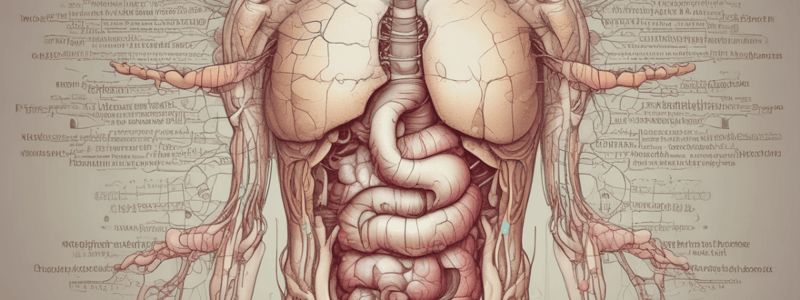Podcast
Questions and Answers
What is the location of the appendix in the body?
What is the location of the appendix in the body?
- On the lower right side of the abdomen (correct)
- On the lower left side of the abdomen
- On the upper left side of the abdomen
- On the upper right side of the abdomen
What is diarrhea typically characterized by?
What is diarrhea typically characterized by?
- Frequent passage of loose, watery stools (correct)
- Infrequent passage of normal stools
- No bowel movements at all
- Frequent passage of hard, dry stools
What is the purpose of a colonoscopy?
What is the purpose of a colonoscopy?
- To detect cancer (correct)
- To diagnose appendicitis
- To treat gastritis
- To cure constipation
What is colorectal cancer also called?
What is colorectal cancer also called?
What is constipation characterized by?
What is constipation characterized by?
What is gastritis an inflammation of?
What is gastritis an inflammation of?
What is a symptom of gastritis?
What is a symptom of gastritis?
Why is the digestive system important?
Why is the digestive system important?
How can you keep your digestive system healthy?
How can you keep your digestive system healthy?
What is the relationship between the digestive system and other body systems?
What is the relationship between the digestive system and other body systems?
Flashcards are hidden until you start studying
Study Notes
The Digestive System
- The purpose of the digestive system is to break down food into a usable form, absorb nutrients, and transport them to cells throughout the body.
Parts of the Digestive System
- Mouth
- Esophagus
- Stomach
- Small Intestine
- Large Intestine
- Liver (A)
- Gallbladder (B)
- Pancreas (C)
Digestion
- Food is broken down into a usable form through mechanical and chemical digestion.
- Mechanical digestion involves tearing, crushing, and mashing food, while chemical digestion involves enzymes breaking down food into nutrients.
Path of Food Through the Body
- Mouth: food is shredded and mixed with saliva, breaking down starches into simple sugars.
- Esophagus: food is pushed into the stomach.
- Stomach: food is broken down into a liquid mixture.
- Small Intestine: digested food passes into the bloodstream through villi, finger-like projections that absorb nutrients.
- Large Intestine: water is absorbed, and waste is stored until eliminated.
- Rectum/Anus: solid waste is eliminated from the body.
Accessory Organs in Digestive System
- Liver: produces bile, breaking down fat.
- Gallbladder: stores bile, releasing it to the small intestine when needed.
- Pancreas: produces enzymes that flow into the small intestine to help neutralize stomach acid.
The Five-Stage Process of Digestion
- A. Ingestion: taking in food through the mouth.
- B. Propulsion: movement of food throughout the alimentary canal/digestive tract.
- C. Digestion: breakdown of food into smaller pieces through mechanical and chemical digestion.
- D. Absorption: taking in of nutrients from digested food into the cells of the body.
- E. Defecation: excretion or release of waste materials that are not absorbed by the body.
Disorders of the Digestive System
- GERD: gastroesophageal reflux disease, where acid-containing contents in the stomach leak back up into the esophagus, irritating the lining.
- HEPATITIS: caused by the virus HBV or HCV, leading to liver damage and potentially cancer.
- Crohn's disease: a type of inflammatory bowel disease, causing inflammation of the digestive tract.
- IBS: Irritable Bowel Syndrome, where the muscles in the bowel wall contract too forcefully or weakly.
- STOMACH ULCERS: open, painful sores in the stomach or upper part of the small intestine.
- APPENDICITIS: inflammation of the appendix.
- DIARRHEA: frequent passage of loose, watery stools, often caused by stress, anxiety, or infections.
- COLON CANCER: cancer that occurs in the colon or rectum, detected through colonoscopy.
- CONSTIPATION: infrequent bowel movements, often due to changes in diet or routine, or inadequate intake of fiber.
- GASTRITIS: inflammation of the lining of the stomach, resulting in loss of appetite, vomiting, nausea, and discomfort after eating.
Caring for the Digestive System
- Eating a healthy diet, managing stress, and exercising regularly to keep the digestive system healthy.
- The digestive system is crucial for breaking down food into simpler forms, and every system in the body depends on it to function properly.
Studying That Suits You
Use AI to generate personalized quizzes and flashcards to suit your learning preferences.




